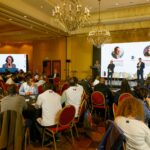ESN has developed together with the Alliance for Health Promotion (Switzerland) and Health Nexus (Canada) a project focused on the promotion of health and well-being of students and youth between the ages of 15 to 20 living in Geneva. The project has received financial support from the State of Geneva, specifically the department of health (Direction Générale de la Santé – DGS) for the year 2021.
The initial activity of the project was to identify relevant health promotion themes through surveys to be disseminated to youth, professionals working in the field of education and health, and international experts, to define the current gaps and needs for improvement in adolescent health promotion. Additional literature research was conducted to define the relevant health promotion themes.
The research led us in hosting a webinar “Health Promotion in Pandemics – Webinar for Youth” on 4 November 2021 that aimed at demonstrating that raising awareness to health promotion is a sustainable and cost-effective solution for a healthier future.
The webinar proposed a unique bottom-up approach where young participants were given a safe space to interact with panelists and give testimonies by taking the floor and/or through interactive tools in 3 breakout rooms:
– Breakout room 1: The Youth: actors of their own health
– Breakout room 2: In Our Heads: Mental Health in times of COVID-19
– Breakout room 3: “I feel good”: exchange of good practices on wellbeing
The breakout rooms were led by the youth representatives Gelan Mahmoud (Egypt), Emma Leeflang (Switzerland) and Laura Plesnar (Croatia). Together with other youth representatives Dr. Rashmi Cherian Paramesh (India), Paul Darrel Meneses (Philippines), Vesa Ilazy (Switzerland), Baye Ibrahima Seck (Senegal) and Eva Luvisotto (Switzerland) they exchanged and interacted with the young audience on their feelings, experiences, and problems encountered during the pandemic.
Among the key messages, youth experienced youth-specific challenges during the pandemic such as distance learning, loss of identity development and construction, fear of transmitting the disease to their loved ones, and the management of pressure to protect their family. They also felt neglected with little or no support from adults finding refuge with friends and social networks. Last but not least, some symptoms of the pandemic have remained and many young people are struggling to return to normal life after a long period of isolation. The anxiety generated was amplified by the extensive use of social media.
Health experts such as Dr. Mervat Gawrgyous and Batool Fatima from the World Health Organization (WHO), Annie Chemla from CIAO Association and Annette Ebbinghaus Mental Fitness Coach took this opportunity for raising awareness about health promotion. They also reminded the importance to create digital tools to help young people manage their mental health.
The youth felt that they contributed and were part of the solution. The interactions, dialogues, and sharing of experiences between young people such as this webinar are very enriching in this sense and should be fostered.
The outcome of the webinar will be the basis of the next deliverables for the last phase of the project.




